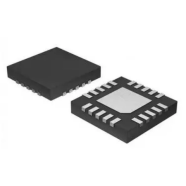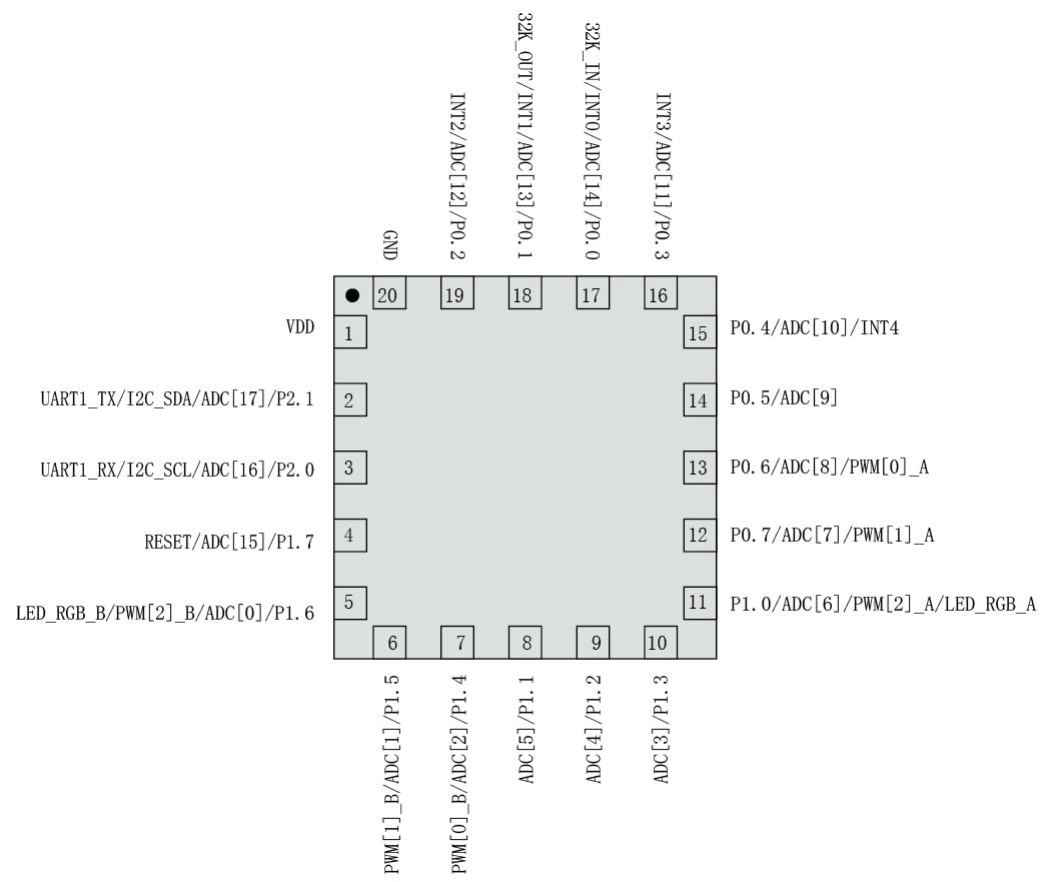CA51M020N2
The CA51M020N2 chip is an 8-bit microcontroller based on the 1T 8051 core, which not only retains the basic characteristics of traditional 8051 chips, but also runs 10 times faster than traditional 8051 chips in general, with superior performance. The chip is equipped with 4KB MTP program memory, 256Byte internal RAM, 256Byte external RAM, and 512Byte EEPROM. It also integrates functional modules such as 18 channels of 12 Bit ADC, 3 channels of 16 Bit PWM, 1 channel of hardware LED0RGB cascade control, 1 channel of I2C, 1 channel of UART, and low voltage detection (LVD). Supports three power-saving modes: IDLE, STOP, and low-speed operation to adapt to applications with different power consumption requirements. Its powerful functions and superior anti-interference performance make it widely applicable to various household appliances and consumer products.

Product Details
Kernel
CPU: 1T 8051, higher speed 10 times faster than traditional 8051
Compatible with 8051 instruction set, dual DPTR working mode
Memory
MTP program memory: 4KB, with more than 1000 repeated erasures
EEPROM: 512 Byte, used to store data that needs to be saved after power failure, with more than 100000 repeated erasures
RAM: 256 Bytes internal RAM, 256 Bytes external RAM
Working voltage
Working voltage: 2.7V~ 5.5V@Fosc =8MHz 2.2V~ 5.5V@Fosc =4MHz
Working temperature
Working temperature: -40 ℃~+85 ℃
Clock system
External low-speed oscillator: 32.768KHz
Built in low-speed RC oscillator: 128KHz
Built in high-speed RC oscillator: 8MHz, accuracy of ± 2% @ 5V/25 ℃ (factory calibrated)
Timer
Two 16 bit universal timers: Timer 0, Timer 1
Universal Input/Output Port (GPIO)
Supports up to 18 GPIO ports
Supports push-pull, open drain, pull-up (30K), pull-down (30K), and high resistance modes
When outputting by push-pull, there are four levels of push current options for GPIO: 10mA, 8mA, 6mA, and 5mA@ VDD=5V
When pushing and pulling output, there are two levels of GPIO current available: 16mA and 8mA@ VDD=5V
GPIO can be software simulated as a 1/2 BIAS LCD driver without the need for external resistors
TMC function
The clock source of TMC timer can be selected as IRCL or XOSCL
The minimum unit of interruption time is 512 IRCL clock cycles when the clock source is selected as IRCL, and 128 XOSCL clock cycles when the clock source is selected as XOSCL
The configurable interrupt time is 1-256 minimum unit times
Interrupt system
7 valid interrupt sources
Two level interrupt priority, supporting nested interrupts
5 external interrupt sources INT0~INT4. External interrupt triggering edge selection: INT0~1 (rising edge, falling edge), INT2~4 (rising edge, falling edge, double edge)
Interrupt input pin selection: INT0 (P0.0), INT1 (P0.1), INT2 (P0.2), INT3 (P0.3), INT4 (P0.4): Analog to Digital Converter (ADC)
Supports 18 channel 12 bit SAR ADCs
Supports two reference voltage sources: VDD and internal reference
Selecting internal voltage as the reference can measure VDD voltage
PWM
Supports 3 PWM outputs, each path can be individually controlled, and the cycle and duty cycle can be freely configured within a 16 bit range
Supports direct output of internal clock function and PWM interrupt function
Supports PWM output pin mapping: PWM0 (P1.4/P0.6), PWM1 (P1.5/P0.7), PWM2 (P1.6/P1.0)
Supports 1 hardware cascade module with a scanning frequency of 800Kbps/S, directly controlling WS2812 or similar driver chips, meeting the requirements of monochrome or seven color LED strip products
Universal Serial Interface (UART1)
Supports 1 full duplex serial port
Supports 1-byte receive cache
I2C interface
Built in 1-channel I2C interface, supporting master-slave mode, standard/fast/high-speed mode
Low Voltage Detection (LVD)
The detection voltage can be set to 2.7V, 3.3V, 3.7V, 4.2V
Low voltage reset or interrupt can be set
Reset mode
The chip supports multiple reset sources: power on/power off reset, soft reset, hard reset, watchdog reset, low voltage detection reset
Watchdog
27 bit watchdog timer, 16 bit adjustment accuracy, configurable watchdog reset or interrupt
Program download and simulation
Support ISP method for downloading programs
Support online simulation function
Low power consumption
STOP mode, current<7uA
IDLE mode, current<33uA
Package type: QFN20



